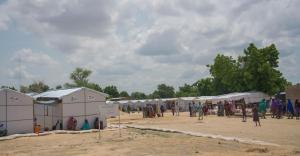WHO releases more than US$ 8 million for the Sahel’s humanitarian response
Brazzaville – World Health Organization (WHO) has released US$ 8.3 million from its Contingency Funding for Emergencies to assist the 10.6 million people in need of emergency health services in the Sahel region.
Humanitarian agencies and governments estimate that 33.2 million people are grappling with the devastating impacts of armed conflict, insecurity, food insecurity and displacement in the Sahel.
The funds will help deliver crucial health services to populations living in displacement camps and sites as well as those affected by disease outbreaks across six countries in the region. In Burkina Faso, around 500 000 people have been displaced by armed violence in 2021. In Mali, a quarter of health services are still disrupted due to the impact of COVIID-19. Cameroon is grappling with a cholera outbreak., while Chad is facing a yellow fever outbreak.
WHO will work to improve treatment of malnutrition in Burkina Faso; strengthen cholera diagnostics in Cameroon; provide essential services to 100 000 people in Chad; deploy psychologists to all 10 regions in Mali; equip and train four outbreak response teams in Niger; and re-establish services in two hospitals in north-east Nigeria, which provide services to some 300 000 people.
“Armed conflict and increasingly worsening impacts of climate change are exerting untold hardship on millions of children, women, families and even entire communities across the Sahel. We are committed to providing crucial health assistance to the affected populations and help ease the deep deprivations they are facing,” said Dr Abdou Salam Gueye, the Director of Emergency Preparedness and Response at WHO Regional Office for Africa.
Health indicators in the Sahel are among the worst in the world. The region has some of the highest maternal mortality rates globally at 856 deaths per 100 000 live births due to poor access to maternal and reproductive health care as well as a high prevalence of early marriage.
Armed attacks against civilians and public infrastructure—including health facilities and schools —droughts, land degradation and unpredictable weather are exacerbating the plight of millions of people in the Sahel.
Conflict and insecurity are a major barrier to delivering humanitarian assistance. These challenges hinder WHO teams and partners from delivering essential medicines, engage communities in public health programmes such as water and sanitation services, distribution of bed nets and basic childhood vaccinations.
Despite the dire needs and the urgency to deliver assistance to millions of people in need in Burkina Faso, northern Cameroon, Chad, north-east Nigeria, Mali and Niger, only half of the US$ 3.7 billion needed to provide life-saving assistance in the region was received in 2021.



